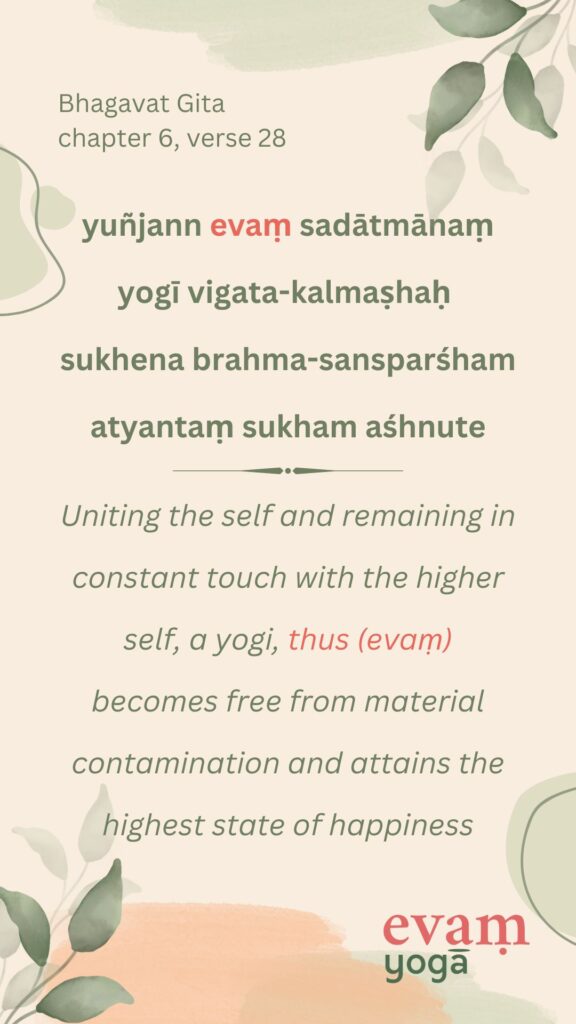“evaṃ”: The essence beyond the word

Understanding the Deeper Significance of "evaṃ" in Movement Practice and Self-Discovery
The Sanskrit word “evaṃ,” is a small but powerful word that can be found throughout various Sutras (a brief scripture that contains expressions of belief and wisdom from religious teachings), indicating that the statement following it is a conclusion drawn from the justification of the preceding sentence. For example in chapter 6, verse 28 of the Bhagavat Gita reads
"yuñjann evaṃ sadātmānaṃ yogī vigata-kalmaṣhaḥ sukhena brahma-sansparśham atyantaṃ sukham aśhnute"
which means "uniting the self and remaining in constant touch with the higher self, a yogi, thus (evaṃ), becomes free from material contamination and attains the highest state of happiness"
The discourses on Buddhist doctrines are often preluded by “Evaṃ mayā śrutam“, meaning ‘thus have I heard’, implying that the following teachings have been passed down by the Buddha himself. Evaṃ here signifies a seeker’s faith in the teachings to guide them toward enlightenment, through wisdom and compassion. The path to enlightenment is often hindered by a seeker’s own presumptions and the dire need to hold on and advocate for them, which puts them on a path of conflict with the self and others. Having faith in the Buddha’s teachings allows one to derive the wisdom of self-reflection and the ability to comprehend another’s point of view with compassion. Thus (evaṃ), through faith one is able to overcome the limitations of their own beliefs, challenge their thoughts and discover enlightening perspectives that negate conflict in their life.
The concept of “evaṃ” transcends its literal interpretation of “thus,” encapsulating the value of both theoretical knowledge and experiential knowledge. It is through each moment of insight and realization that we gain a deeper understanding of our limitations, and subsequently, continue to progress. By integrating our theoretical knowledge with the experiential aspect of our practice, we develop a heightened appreciation and humility for the depth of our inner selves, the uniqueness of our being, and the vastness of our surroundings.
A young monk once approached his wise old master, seeking to understand the difference between learning and understanding. In response, the master handed the student a bowl of rice and instructed him to wash it, place it in a pot of water over a fire, and carefully stir it as it cooked.
The student followed the instructions diligently, but taking it off the fire thinking the rice was ready, he found it to be uncooked and unappetizing. Undisturbed, the master instructed him to try again, but this time to focus on understanding the rice and the heat of the fire.
With his attention fixed on the elements at play, the student approached the task more intentionally, taking care to observe the rice and the heat of the fire. While the rice was now cooked, it was lumpy and uneven. The old monk then set the student on a task of repeating the process until he had achieved a bowl of perfectly cooked rice.
Over time, the young monk learnt to approached the task with greater curiosity and openness, gradually coming to understand the various factors that contributed to the art of cooking rice. While he understood the process better, he also began to factor in the realization that, He too, as a doer was part of the elements and that the state of his being – physical or psychological – played an integral part in outcome of the task Through patience dedication and mindfulness, he honed the skill and mastered the art of cooking rice with perfect texture and flavor, thereby realizing the difference between learning and understanding.
It is through the transformative power of experience that we gain a deeper understanding of ourselves and the world around us, ultimately leading us towards our next destination on the ongoing journey of self-discovery and growth. Theoretical knowledge offers guidance and direction, derived from past experiences of the one giving it, meant to seek refuge in while contemplating one’s own experiential path. The story of the young monk and his wise master further elucidates the significance of understanding and honing a skill, as opposed to solely relying on recognized direction.
The “evaṃ” approach to movement practice encourages individuals to approach their practice with a sense of openness, curiosity, and willingness to learn from their experiences, rather than simply following the directives of external authorities. The path to mastery is not predetermined, rather, it is subject to the transformative power of experience, as each new encounter shapes and alters our perception, leading us towards our next destination. As the young monk demonstrated, the mastery of a skill is not an endpoint, but rather the beginning of a new path on an ongoing journey towards self-discovery and growth.
Image Credit : Ethan Sees
Image Source : Pexels
